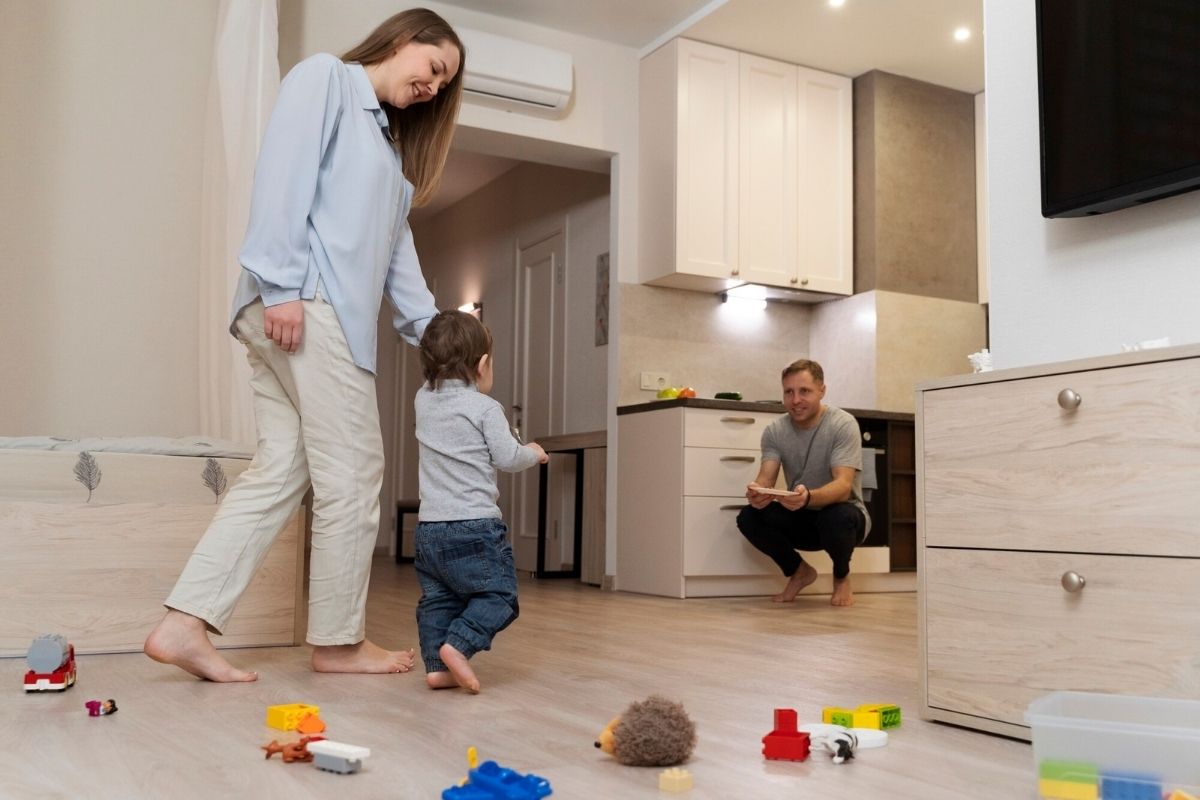
Photo Credit: Freepik.com
Adjusting to Parenthood: Navigating Changes and Strengthening Relationships
Families come in many forms-blended, same-sex parents, nuclear families and foster families. No matter the composition, adjusting to a new baby at home is a significant transition that takes time and patience.
Parenthood: Understanding Matrescence and Patrescence
Mothers experience a developmental phase called matrescence, where their identity evolves as they transition into motherhood. This journey involves balancing their previous self with new maternal responsibilities. Similarly, fathers undergo patrescence, adjusting to their role in parenthood over time. While becoming a parent happens instantly, fully embracing the identity of a mother or father takes longer.
Parenthood and Changes in Family Dynamics:
1. Shifting Roles and Responsibilities: Parenthood often shifts the dynamics between partners. As one parent spends more time with the baby-especially in case of breastfeeding-the other might feel left out. Financial pressures and sleep deprivation can also impact relationships. Acknowledging these changes and adjusting roles can help maintain balance.
2. Planning Ahead: Preparing for a baby isn’t just about setting up a nursery- it also involves discussing how roles, routines, and responsibilities will shift. Open conversations about expectations can ease the transitions.
3. Adapting to New Responsibilities: Household duties often need redistribution after a baby arrives. If one partner feels overwhelmed, resentment can build. Listing and dividing tasks equitably can ensure both parents feel supported.
4. Supporting Siblings: Older Children may struggle with the arrival of a new sibling. Including them in preparations and ensuring they receive individual attention can help them feel valued and secure in the evolving family structure.
Self-Care Tips for New Parents:
A. Prioritising Sleep: Lack of sleep can make everything harder. While rest may seem impossible in the first few months, taking short naps or accepting help from friends and family can make a difference.
B. The Power of Fresh Air: Even a brief outdoor walk can boost mood and energy levels. Parents should aim to step outside daily, either with the baby or alone for a quick break.
C. Communicating Openly: Effective communication between partners is essential. Expressing needs, sharing concerns, and checking in regularly can prevent misunderstandings and strengthen relationships.
D. Seeking Support: Parenting takes a village. Whether from family, friends or professionals, asking for help is a sign of strength. If emotional struggles arise, mental health providers can offer guidance.
Strengthening Relationships Post-Baby:
1) Managing Stress and Conflict: Fatigue, limited personal time and financial concerns can strain relationships. Managing expectations, discussing financial adjustments, and setting aside time for each other can ease stress.
2) Balancing Parenting Styles: Differences in parenting approaches can create tension. Instead of viewing one method as superior, parents should collaborate and respect each other’s perspective.
3) Maintaining Physical Intimacy: Exhaustion and post-birth recovery can impact physical relationships. Patience, open communications and small gestures of affection can help partners stay connected.
Building a Support System:
A. Relationships with Family and Friends: New Parents often experience shifts in their social circles. Some relationships strengthen, while others may become distant. Communicating needs and setting boundaries with well-meaning but unsolicited advice can help maintain healthy connections.
B. Making Time for Yourself and Your Partner: Caring for a baby is demanding, but setting aside time for personal hobbies and shared activities with a partner can enhance overall well-being. Even small moments together like watching a movie or sharing a meal, can help maintain a strong connection.
Seeking Professional Support:
Adjusting to parenthood can be overwhelming. If relationships struggles, anxiety or emotional challenges become difficult to manage, professional therapy can provide guidance. At ImPerfect Psychotherapy, we offer support tailored to new parents, helping them navigate transitions and build resilience. Reach out to us for expert guidance in maintaining well-being and strengthening family bonds.
Read more in our latest blog: Postpartum Concerns & Therapy
By Urveez Kakalia and Krupa Abraham
Reference:
1. https://www.uclahealth.org/news/article/family-dynamics-how-relationships-change-after-having-a-baby
3. https://www.nhs.uk/conditions/baby/support-and-services/relationships-after-having-a-baby/
Further Reading:
Härkönen, J., Bernardi, F., & Boertien, D. (2017). Family dynamics and child outcomes: An overview of research and open questions. European Journal of Population, 33, 163-184.
Mulder, C. H. (2013). Family dynamics and housing: Conceptual issues and empirical findings. Demographic research, 29, 355-378.
Smits, A., & Mulder, C. H. (2008). Family dynamics and first-time homeownership. Housing Studies, 23(6), 917-933.
